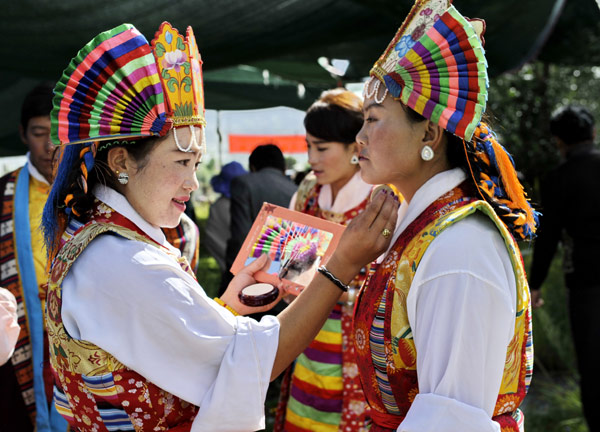Tibet envisioned as hub of Himalayas Zhang Zhihao
Tibet could become the cultural, economic and humanitarian hub of the Himalayas and so build a peaceful, cooperative relationship with its South Asian neighbors, experts at the Sixth International Forum on Tibetan Studies have suggested.
Sandwiched between the Silk Road Economic Belt and the 21st Century Maritime Silk Road, Tibet plays a significant role in connecting both initiatives, making it an ideal place for cultures to meet.
"With its beautiful thangka (Buddhist-themed paintings on cloth) and unique clothing, Tibetan culture is very attractive in the Himalayan region. Its influence can radiate through mountains and connect with other South Asian countries," said Lai Shanglong, chief economic commissioner of the United Nations Department of Economic and Social Affairs.
In June last year, China opened a new land route along Himalayan Nathu La Pass for Indian pilgrims to visit the holy sites of Mount Kailash and Lake Mansarovar in Tibet, considered sacred by Hindus and Buddhists. The initiative was universally hailed.
Lai said if China expanded its humanitarian aid projects in Tibet to other South Asian countries - providing practical services such as teaching, repairing buildings and medical treatment - that initiative would also earn praise.
"This would strengthen goodwill toward China in South Asian communities, improve China's image and increase support from neighboring countries," he said.
Trade routes such as the Ancient Tea Horse Road have facilitated economic and cultural interaction for centuries, said Liu Zhifu, director of the South Asia Research Institute at Xizang Minzu University.
Today, the Belt and Road Initiative is breathing new life into Burang, Gyirong, Zham and other ports.
"There is huge demand for high-quality, authentic Tibetan goods, like incense and highland barley products," said Di Fangyao, executive deputy director of the institute.
However, most of the trading goods are not made in Tibet.
"It's high time that Tibet increase its exports of locally produced goods," Di said.
Di also spoke of the importance of infrastructure. The border trading market in Yadong county can open for only six months before the harsh winter sets in.
"I once saw a family of four herding two dozen donkeys carrying cement on their way to Nepal. There is no way the economic and cultural weight of the Belt and Road Initiative can be carried on donkeys," he said.
Zhang Zhihao contributed to this story.
Center looks at politics, history and culture of region
The China Tibetology Research Center in Beijing has focused on studies of the politics, economy, history, culture, religion and language of the Tibet autonomous region and neighboring areas since its establishment in May 1986.
The center's collection of more than 100,000 books, magazines and video and audio materials, in both the Mandarin and Tibetan languages, serves as a major database for Tibetology studies. It also has prioritized the protection and rescue of ancient Tibetology works, applying for a number of key national projects to protect the traditional Tibetan culture.
In 2011, the center completed the compiling of the Tibetan manuscripts in the Tripitaka Sinica, known as the Chinese Buddhist canon.
The center also published A Complete History of Tibet, the country's first comprehensive look at the history and culture of Tibet, in November.
Additionally, the center has established multiple platforms for promoting exchanges on Tibetology studies.
The Tibetan Culture Museum, also in Beijing, has served as a window to Tibet's unique cultural traditions as well as cultural relics in the capital.
The center has developed Qomolangma fonts, which are the international standard computer fonts for the Tibetan language.
|
 A Tibetan Opera actress helps a cast member apply makeup before a Tibetan Opera competition in Lhasa, capital of the Tibetan autonomous region, on Tuesday. Zhang Rufeng / Xinhua |


















